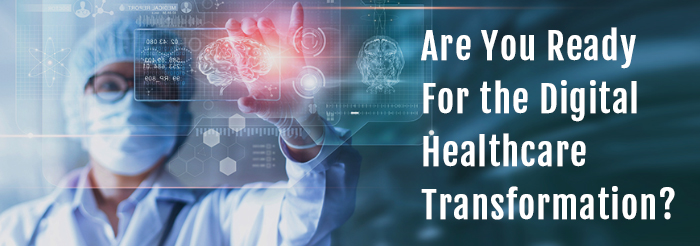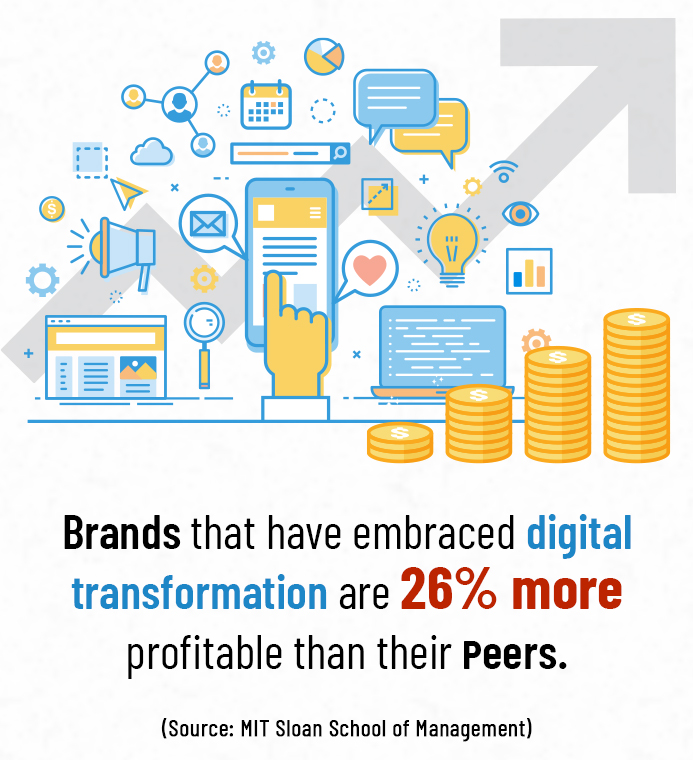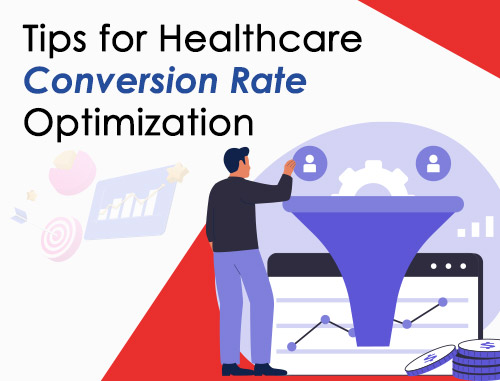Are You Ready For the Digital Healthcare Transformation?
Posted on
The healthcare marketing funnel looks something like this: Awareness, Consideration, Evaluation and Decision.
Usually, traditional marketing strategies are responsible for the first part of the funnel, and then sales take over. However, digital transformation has changed – and is continuing to change – the roles within the marketing funnel.
Technology has introduced a range of tools that take the guesswork and grunt work out of healthcare marketing. Specifically, and thanks to analytics, healthcare marketers have a more precise picture of who their target audience is.


Here is a summary of the strong impact of digital transformation in healthcare marketing:
Awareness
The first step of the funnel is where you introduce your brand to potential patients. One of the most effective ways to show your brand in a positive light is through marketing automation (MA), which is a money- and timesaver. MA is at the core of personalization, which is necessary for enhancing the patient experience on an individual level. Predictive analytics and other techniques help marketers identify who is likely to move further down the funnel. Once you are able to make an excellent first impression, your lead has moved down the funnel and expressed interest in your service. Analytics will help you here and show you what kinds of messages are likely to interest them. Once you know your patients and their preferences, it will be much easier to address them.
Consideration
At this point, healthcare marketers want to turn the prospect’s interest into action. To do that, they use predictive analytics technology to determine any additional information that would help prospects choose their healthcare brand. With the information learned from the Awareness step of the funnel, healthcare marketers transition prospects from the “I like this brand” stage to the “I want to schedule an appointment” stage.
Evaluation
At this stage, to turn prospects’ consideration into action, healthcare marketers can compare their services with those of competitors. This kind of transparency helps earn prospects’ trust.

At this stage, patients intend to book an appointment. Healthcare marketers can use technologies like artificial intelligence and chatbots to answer any additional questions. The goal is to make the prospect schedule the appointment. Even if the prospect leaves your website without filling out the contact form, AI will use the information gathered, such as an email address and Facebook profile, to communicate the “forgotten task.” Often at this time, AI would offer prospects a discount or free consultation to lure them back in. This kind of personalized healthcare marketing is innocuous yet useful and continues to influence prospects’ decisions.

Decision
Predicting the prospect’s behavior and scheduling the appointment is simplified by the 80/20 rule. According to this rule, 80 percent of your revenue comes from 20 percent of your prospects, and 80 percent of your leads come from 20 percent of your campaigns. Predictive analysis, like AI, identifies the 20 percent. Not only should you strive to book the appointment, but your ultimate goal should be to earn the prospect’s trust – effectively creating loyal, repeat patients.
Ensuring Personalization
One of the most promising ways that digital transformation has changed the way healthcare marketing works is the way it personalizes content.

Due to the unique combination of interactivity and metrics, it’s now possible to track the actions and behavior of patients at an individual level, then take that data to provide a personalized healthcare marketing response.
Monitoring prospects’ activities and suggesting relevant products or services is just the tip of the iceberg. Now, with advanced insights from social platforms like Facebook, it is possible to track the interests of qualified leads, make recommendations and send personalized emails based on a specific prospect’s behavior before he or she converts.
Analytics, a game-changer in healthcare marketing, continues to emphasize its usefulness in future marketing campaigns. For instance, your marketing team can upload a short video on YouTube or Integra and can find out how many people watched the video. In addition, it is possible to know if viewers clicked on the “Call To Action” button and landed on your website. Your team can easily measure the effectiveness of the video and its conversion rate.
Simply put, digital healthcare transformation gives marketers precise user data and metrics, allowing them to tweak and optimize plans. Knowing what works and what doesn’t will make your marketing team more agile, responsive and targeted.

Automation Is Making Us More Proactive
Timing can be a critical aspect when influencing a prospect’s purchasing decision. A prospect might be “on the fence” about scheduling an appointment and even get so far as to take the initial steps to book, only to stop at the last minute before calling your office.
Automation combined with metrics means that the prospect’s behavior is tracked; it can be addressed without requiring a human to monitor the activity and be vigilant enough to catch it and react to it. Digital healthcare transformation means that when specific actions or data are recognized, the software’s intelligence can act upon those conditions to send personalized responses promptly, and it understands the time-sensitive nature of the issue.
We are increasingly seeing this type of automation as chatbots take on the role of patient service support for simple tasks, improving healthcare marketers’ response time as well as productivity.

Conclusion
Digital healthcare transformation continues to change the marketing funnel, customizing the prospect’s experience at every turn. To effectively measure success, healthcare marketers must create data-driven metrics that, above all else, view patient feedback as an invaluable component. Embracing the right technology allows marketers to educate and inspire patients, creating a lasting, loyal patient base.

 7 Christmas Social Media Post Ideas for Hospitals ..
7 Christmas Social Media Post Ideas for Hospitals .. How to Create a Winning Healthcare Marketing Strat..
How to Create a Winning Healthcare Marketing Strat.. Tips for Healthcare Conversion Rate Optimization
Tips for Healthcare Conversion Rate Optimization